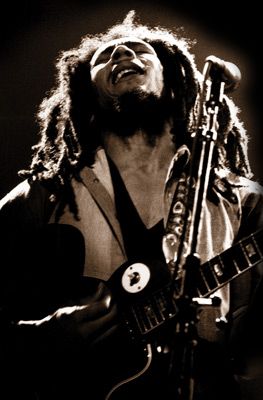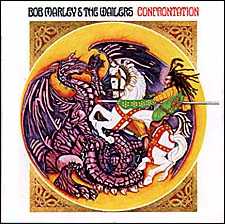World
Literature in English
Bob Marley and Jamaica
last updated May 4, 1999
|
General issues:
|

|
Biography
Political & Social Situations of Jamaica:
-
"Caribbean
Basin Initative"-- the Reagan Administration's Caribbean Basin Initative
linked to neo-colonialism and the collapse of the Jamaican economy in the
1980s. "The entire CBI campaign had been a bribe to induce Jamaica
and the rest of the Caribbean to accredit the armed confrontation in Grenada.
It also provided a cover for $75 million in additional combat funding for
the war in El Salvador."
-
The
Rise of Rastafari in Jamaica--The roots, core beliefs and practices
of Rastafari lie close to Bob Marley's music and philosophy. This section
puts the religion in context and dispels popular misconceptions about the
philosophy and lifestyle of devout Rastas.
"What is Reggae?"
from All Music Guide (Go
there
for major artists)
Reggae is a music unique to Jamiaca, but it ironically has its roots
in New Orleans R&B. Reggae's
direct forefather is ska, an uptempo, rhythmic variation based
on the New Orleans R&B Jamaican
musicians heard broadcast from the US on their transistor radios.
Relying on skittering guitar and
syncopated rhythms, ska was their interpretation of R&B
and it was quite popular in the early '60s.
However, during one very hot summer, it was too hot to either
play or dance to ska, so the beat
was slowed down and reggae was born.
Since then, reggae has proven to be as versatile as the blues,
as it lends itself to a number of interpretations, from the melodic rock
steady of Alton Ellis and the rock and folk-influenced songwriting
of Bob Marley to the trippy, near-psychedelic soundscapes of dub artists
like Lee "Scratch" Perry. It has crossed into the mainstream through the
bright, bouncy "reggae sunsplash" festivals and pop-oriented
bands like UB40, but more adventurous reggae artists, such as Marley
and Perry, have influenced countless reggae, folk, rock and dance
artists. Their contributions resonate throughout popular music.
from The
Origin of Reggae in Bob Marley
site
"As far as Jamaican record-buyers are concerned,
the word reggae was coined on a 1968
Pyramid dance single, "Do the Reggay (sic),"
by Toots and the Maytals. Some believe the
term is derived from Regga, the
name of a Bantu-speaking tribe on Lake Tanganyika. Others
say it is a corruption of "streggae," Kingston
street slang for prostitute.
Bob Marley claimed the word was Spanish in
origin, meaning "the king's music." Veteran
Jamaican studio musicians offer the simplest,
and probably the most plausible, explanation.
"It's a description of the beat itself," says
Hux Brown, lead guitarist on Paul Simon's 1972
reggae-flavored hit, "Mother and Child Reunion,"
and the man widely credited with inventing
the one-string quiver/trill that kicked off
Simon's single as well as many of the top island hits of
the preceeding years.
"It's
just a fun, joke kinda word that means the ragged rhythm and the body feelin'.
If
it's got a greater meanin', it doesn't matter," Brown said.
Songs and Lyrics:
More
lyrics from International Lyrics
Server
For Further Studies:
-
Bob Marley site
-
The
assassination attempt: the political machinations behind
the assassination attempt days before the PNP-sponsored "Smile Jamaica"
concert in December 1978.
-
Hippies
& Rastas in Jamaica: "It was not until well-to-do, hardcore
hippie vagabonds who had survived in the late 1960s began to make their
way to ready-made paradises like Maui, St. Martin, St. Bart's and other
tropical islands in the early 1970s that they discovered Jamaica. There
seemed to be a superficial affinity between rich hippies and Rastas, the
former having inherited the means to turn their backs on much of society,
the latter having
inherited the conviction. The Rastaman knew he had no choice;
the hippies, full of themselves, said the same thing as they sat
half-naked on the patio at Rick's Cafe and sipped rum punch."
-
Rastafari
page from Bob Marley site.
 |
On the cover of Confrontation, Bob Marley was depicted as an Ethiopian
horseman (complete with the traditional thong stirrup, a reference by art
director Neville Garrick to the deadly cancer that began in Marley's toe)
who's been transformed into St. George slaying the dragon. |
-
The Story of Jamaican music--"In
Jamaica, where technical resources are scarce, everything is recycled
continually. So it was with rhythms: the backing tracks for songs could
serve equally well as backing for instrumentals, or deejay raps, and then
be dubbed again. It occured to Bunny that a whole LP could be made using
just one rhythm."
back

